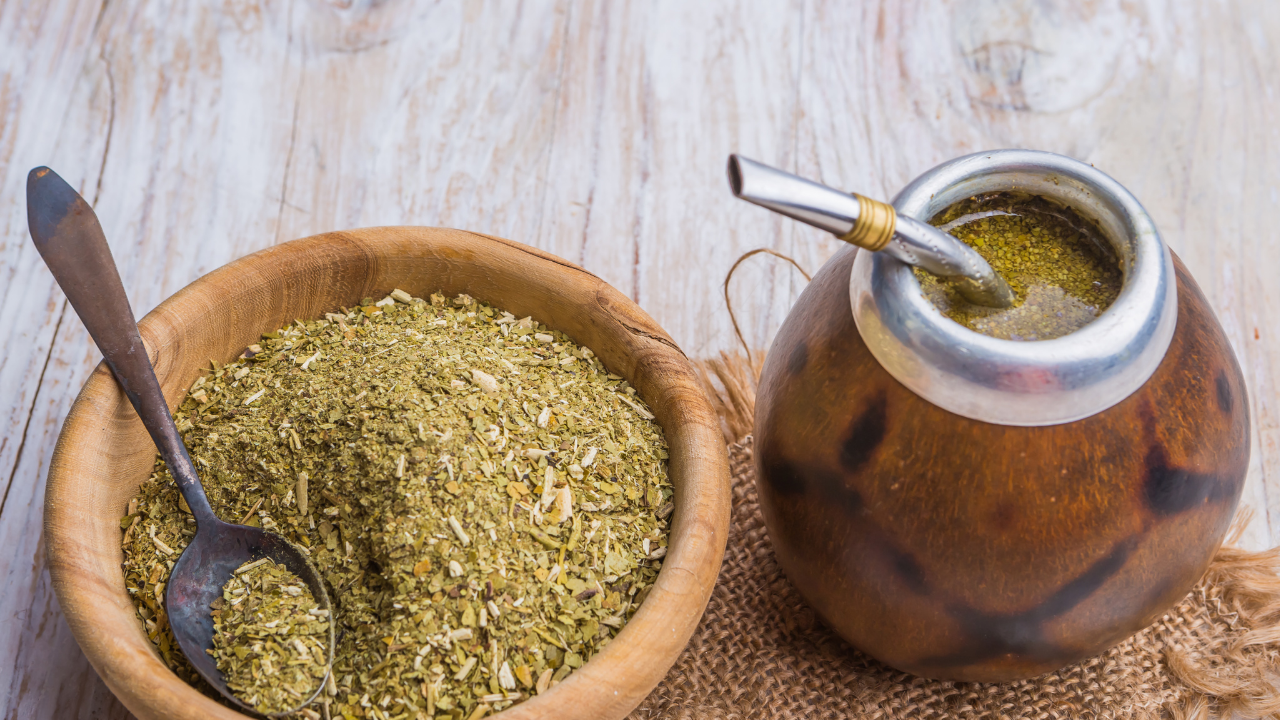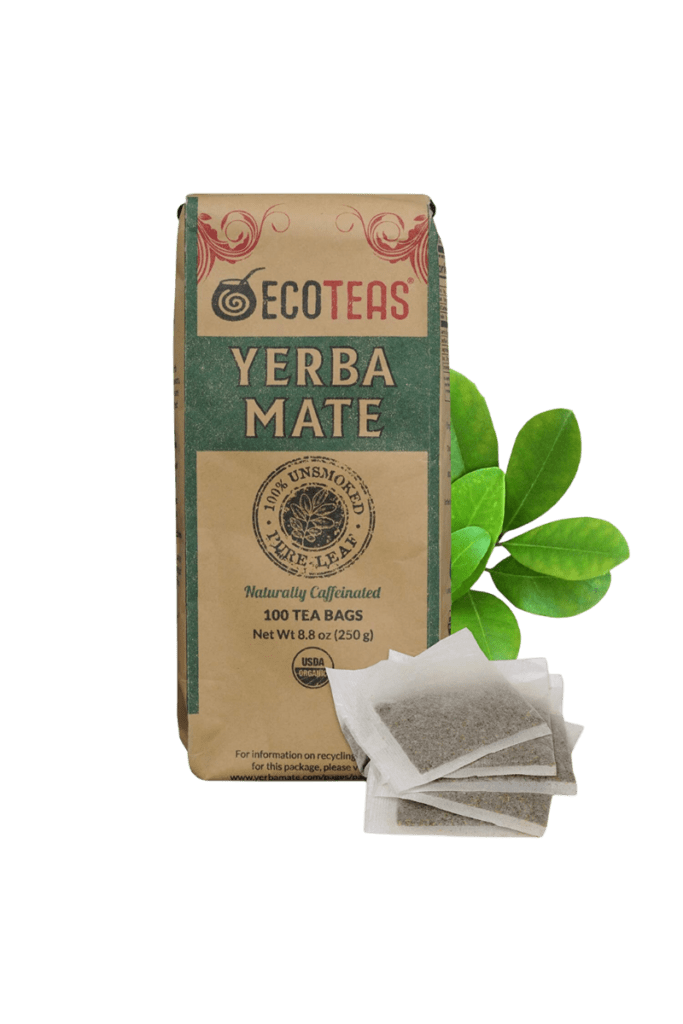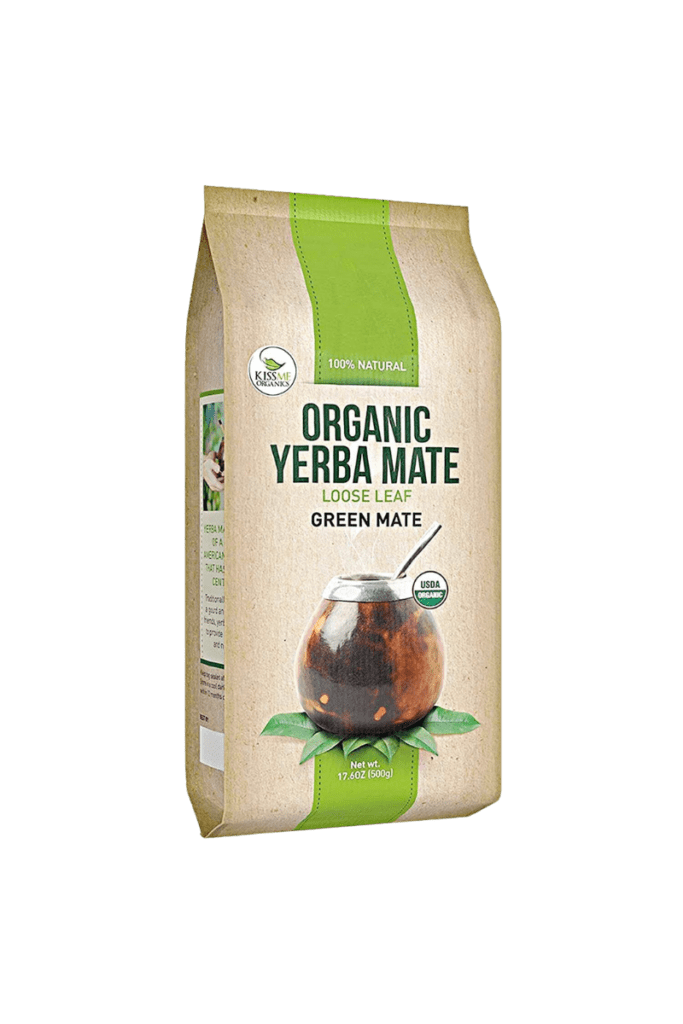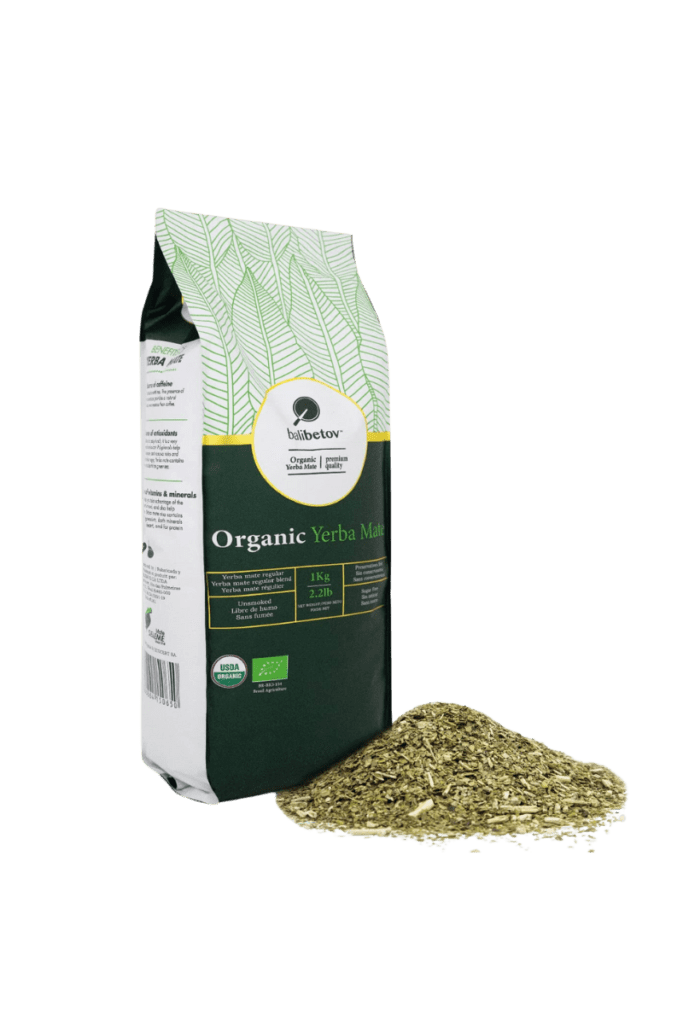The Best 4 Health Properties Of Yerba Mate
Yerba Mate or Paraguay tea, obtained from the leaves and stems of the Ilex paraguariensis plant, is known for its taste, aroma, and health-promoting properties.

Yerba Mate or Paraguay tea, obtained from the leaves and stems of the Ilex paraguariensis plant, is known for its taste, aroma, and health-promoting properties. Consumption of tea may have a beneficial effect on human health, including a protective effect on liver cells, stimulation of the central nervous system, an anti-inflammatory effect, and a positive effect on the cardiovascular system. However, high consumption of yerba mate tea, especially when very hot, may increase the risk of cancer, which is yet to be confirmed by scientific studies.
Keywords: tea, Yerba mate, medicinal effects (health implications), Ilex paraguariensis
Top 3 Organic Yerba Mate You Should Try
What Is Yerba Mate?
Yerba Mate, also referred to as Paraguay tea is prepared by steeping a blend of dried and crushed leaves (constituting around 95% of the mixture) and stems (constituting approximately 5%) obtained from the Ilex paraguariensis A.St.-Hilaire tree✅.
This tea is native to South America and is mainly found in parts of Argentina, Paraguay, Uruguay, and Brazil. It is difficult to grow outside of these regions, and attempts to do so in other areas with similar climates have not been successful. As a result, most crops come from wild trees, but there is some controlled cultivation in South America✅.
The Paraguay tea, also known as mate in Spanish-speaking countries and chimarrão in Brazil, was first discovered by the Guarani Indians who lived in the basin of the Paraguay River.
The tea was considered a gift from Mother Earth by the inhabitants of the region✅.
The tea is made by partially filling a gourd with dried leaves and hot water at a temperature of 70-80°C.
The gourd can be refilled several times with warm or cold water, known as tereré. To prevent the crushed leaves, fine stems, and dust from getting into the mouth, a drinking straw with a filter called bombilla is used.
The dried yerba mate is appreciated worldwide for its taste, aroma, stimulatory, health-promoting, and nutritional attributes✅.
It is one of the most commercially cultivated plants in South America, with approximately 30% of the population drinking more than one liter of the brew daily✅.
In 2002, the National Yerba Mate Institute was founded in Argentina to initiate and finance studies on the properties of this Yerba Mate.
Yerba mate is a popular beverage in Paraguay and Uruguay that people enjoy during daily activities.
In Argentina, the average person consumes 5 kg of dried yerba mate leaves annually, while in Uruguay it's around 10 kg per person✅.
Yerba Mate tea has gained popularity in North America and Europe, with Poland also joining the trend✅.
From 2012-2018, there has been an 8-fold increase in the import of dried yerba mate to Poland, with approximately 150 tons being imported in 2016✅.
The tea is promoted in the media and is consumed by celebrities and dieticians who emphasize its health benefits.
Yerba Mate contains about 200 chemical substances, including minerals, xanthines, flavonoids, anthocyanins, procyanidins, phenolic acids, rutins, and saponins.
It is used as a medicine for fatigue, and anxiety, and to support metabolism and stimulate the nervous system✅.
Consumption of Yerba Mate may provide valuable mineral components.
Best Features:
- Climate Pledge Friendly
- USDA Organic
- Certified Kosher
- Nutritious Tea Bags
Why buy it
- Single Origin
- Naturally Caffeinated
- Rich in Antioxidants

Health Benefits of Consuming Yerba Mate
1. May Help Weight Loss
Numerous studies have been conducted in recent years to analyze the impact of consuming Ilex paraguariensis on the health of both humans and animals.
After 12 weeks, a reduction in body mass and a decrease in waist-to-hip ratio were observed in the subjects.
Therefore, Paraguay tea has shown promising results in treating obesity✅✅.
Research conducted on mice has revealed that long-term supplementation of Yerba Mate can potentially reduce obesity, insulin resistance, dyslipidemia, and hepatic steatosis✅✅✅.
A study conducted on both males and females has confirmed that taking a one-gram capsule of Yerba Mate before moderate physical exercise can increase fat burning by 24% and improve sports outcomes without negatively affecting maximal exercise performance✅.
The analysis of fatty acid content in Yerba Mate mixtures revealed a considerable presence of linoleic acid and alpha-linolenic acid, with approximately 250 ug/mL and 600 ug/mL, respectively, in a fresh brew✅.
Thus, consuming Yerba Mate brew may provide the body with these essential fatty acids, which are crucial for a well-balanced diet.
For regular Yerba Mate drinkers, this could serve as an important source of polyunsaturated fatty acid supplementation.
2. May Help Treat Cancer
In 2011, Puangpraphant et al. conducted a study confirming that the leaves of the Paraguayan holly plant have both anti-cancer and anti-inflammatory properties✅.
The study found that derivatives of caffeoylquinic acid (CQA) are effective in treating colorectal cancer and may reduce inflammation in other diseases.
Yerba Mate, which contains natural compounds called saponins, has also been found to have anti-inflammatory properties. Additionally, this beverage contains small amounts of vitamins C and E, selenium, and zinc✅.
A study conducted on Uruguayan women showed that high consumption of Yerba Mate (more than one liter) was associated with a lower risk of breast cancer✅.
3. May Against Pathogen
Yerba Mate has been found to have the potential in preventing infections caused by bacteria, parasites, and fungi.
Studies have shown that a high dose of Yerba Mate extract can deactivate E. Coli bacteria, which is responsible for the symptoms of food poisoning such as stomach cramps and diarrhea✅✅.
Compounds present in Ilex paraguariensis A.St.-Hil. may also prevent the growth of Malassezia furfur, a fungus responsible for skin exfoliation, dandruff, seborrheic dermatitis, and skin rashes.
The traditional treatment for this fungal infection with the use of relatively toxic drugs is long-lasting and costly.
However, studies have shown that the aqueous extract of Yerba Mate possesses inhibitory activity against Malassezia furfur, making it a potential alternative anti-fungal agent✅.
Additionally, saponins found in the species of Paraguayan holly plant show anti-inflammatory and hypocholesterolemic properties✅.
Best Features:
- Cultivated in Brazil
- Climate Pledge Friendly
- USDA Organic
- Packed With 7 Amino Acids
- Nutritious Loose Leaf
Why buy it
- Weight Loss Support
- Stimualte Immune System
- Rich in Antioxidants

4. Act As Mood Booster
Yerba Mate, a well-known drink, is appreciated for its health benefits and stimulating properties.
It has gained popularity as an alternative to coffee due to its lower caffeine content.
A 200 ml serving of Yerba Mate contains about 71.8 mg of caffeine, whereas the same quantity of cappuccino coffee contains 86.8 mg✅.
Yerba Mate can be infused multiple times, up to 7 times, without losing its taste or nutritional value✅.
Caffeine, which is present in beverages like coffee and tea, is a stimulant that has been scientifically proven to improve short-term memory, alertness, and reaction time. Research has shown that individuals who consume a daily dose of 37.5-450 mg of caffeine experience these benefits.
Consumers of Yerba Mate have reported feeling energized without experiencing the nervousness that can sometimes accompany coffee consumption✅.
Additionally, research on rats has shown that Yerba Mate does not negatively impact bone health, despite its high caffeine content✅.
However, it is important to note that excessive caffeine intake can lead to headaches, migraines, and high blood pressure in some individuals, particularly pregnant women, who should limit their consumption due to the risk of miscarriage and low birth weight ✅.
Cold brewing Yerba Mate is considered the most effective way to consume it as it provides the highest amount of unaltered polyunsaturated fatty acids.
This method also reduces the risk of cancer by minimizing exposure of the gastrointestinal tract to high temperatures, according to research ✅.
Risks Associated with High Consuming Yerba Mate
Yerba Mate has been found to have a positive effect on human health when consumed in moderation.
However, it is important to note that Paraguay tea contains polycyclic aromatic hydrocarbons (PAH), which are known to be carcinogenic and are also present in tobacco smoke and grilled meat✅.
A study conducted on Uruguayan males found a correlation between consuming more than 2.5 liters of Yerba Mate daily and an increased risk of esophageal cancer✅✅.
Similarly, observations in South America showed a link between high consumption of Yerba Mate and an increased risk of neck and head cancer.
In addition, drinking very hot beverages may contribute to the development of mouth cancer.
It is worth considering that many of the populations studied also consumed alcohol and tobacco products, which could have affected the results obtained✅✅✅.
The effects of long-term consumption of Yerba Mate prepared with hot water on rats were investigated through a study.
After five months, the group that consumed Yerba Mate showed a higher incidence of tracheitis and bronchiolitis compared to the control group that consumed only water.
Histological examination of several organs including the upper respiratory tract, pancreas, bladder, stomach, esophagus, duodenum, and kidney revealed significant differences between the two groups.
However, the study did not find any evidence of tumor growth in the esophagus, oral cavity, bladder, or kidneys.
These findings suggest that continuous consumption of Paraguay tea for a large part of life may have negative effects on the upper aerodigestive tract✅.
Best Features:
- Climate Pledge Friendly
- EU Organic
- USDA Organic
- Gluten-Free & Vegan
- 100% Unsmoked Pure Leaf
Why buy it
- Enhance Energy & Focus
- Health & Digestive Systenm
- Rich in Mineral, Vitamins, Antioxidants

Key Takeaways
- Yerba Mate or Paraguay tea is obtained from the leaves and stems of the Ilex paraguariensis plant.
- Yerba Mate is known for its taste, aroma, and health-promoting properties.
- Consumption of Yerba Mate tea may have a beneficial effect on human health, including a protective effect on liver cells, stimulation of the central nervous system, an anti-inflammatory effect, and a positive effect on the cardiovascular system.
- High consumption of Yerba Mate tea, especially when very hot, may increase the risk of cancer, which is yet to be confirmed by scientific studies.
frequently Asked Questions
Is Yerba Mate a good alternative to coffee?
Where can I buy Yerba Mate tea?
What is Yerba Mate?
What are the health benefits of Yerba Mate?
References
Fitnature uses only high-quality sources, including peer-reviewed studies, to support the facts within our articles. Read our editorial process to learn more about how we fact-check and keep our content accurate, reliable, and trustworthy.
- Administrator, Florczak J., Karmańska A, Wędzisz A, Brożek E. “Skład Chemiczny Suszu Różnego Gatunku Yerba Mate.” Bromat Chem Toksykol, no. 4, 2011, pp. 1105–10.
- Alkhatib, Ahmad. “Yerba Maté (Illex Paraguariensis) Ingestion Augments Fat Oxidation and Energy Expenditure during Exercise at Various Submaximal Intensities.” Nutrition & Metabolism, vol. 11, Sept. 2014, p. 42, https://doi.org/10.1186/1743-7075-11-42.
- Andersen, T., and J. Fogh. “Weight Loss and Delayed Gastric Emptying Following a South American Herbal Preparation in Overweight Patients.” Journal of Human Nutrition and Dietetics, vol. 14, no. 3, pp. 243–50, https://doi.org/10.1046/j.1365-277X.2001.00290.x. Accessed 10 July 2023.
- Brun, Lucas R., et al. “Effects of Yerba Mate (IIex Paraguariensis) on Histomorphometry, Biomechanics, and Densitometry on Bones in the Rat – PubMed.” Calcified Tissue International, vol. 97, no. 5, Nov. 2015, https://doi.org/10.1007/s00223-015-0043-0.
- Burris, Kellie P., Philip M Davidson, et al. “Antimicrobial Activity of Yerba Mate (Ilex Paraguariensis) Aqueous Extracts against Escherichia Coli O157:H7 and Staphylococcus Aureus – PubMed.” Journal of Food Science, vol. 76, no. 6, Aug. 2011, https://doi.org/10.1111/j.1750-3841.2011.02255.x.
- Burris, Kellie P., P M Davidson, et al. “Aqueous Extracts of Yerba Mate (Ilex Paraguariensis) as a Natural Antimicrobial against Escherichia Coli O157:H7 in a Microbiological Medium and pH 6.0 Apple Juice – PubMed.” Journal of Food Protection, vol. 75, no. 4, Apr. 2012, https://doi.org/10.4315/0362-028X.JFP-11-214.
- Choi, Myung-Sook, et al. “Long-Term Dietary Supplementation with Yerba Mate Ameliorates Diet-Induced Obesity and Metabolic Disorders in Mice by Regulating Energy Expenditure and Lipid Metabolism – PubMed.” Journal of Medicinal Food, vol. 20, no. 12, Dec. 2017, https://doi.org/10.1089/jmf.2017.3995.
- de Morais, Elayne C., et al. “Consumption of Yerba Mate ( Ilex Paraguariensis ) Improves Serum Lipid Parameters in Healthy Dyslipidemic Subjects and Provides an Additional LDL-Cholesterol Reduction in Individuals on Statin Therapy – PubMed.” Journal of Agricultural and Food Chemistry, vol. 57, no. 18, Sept. 2009, https://doi.org/10.1021/jf901660g.
- Filip, R., and G. E. Ferraro. “Researching on New Species of ‘Mate’: Ilex Brevicuspis: Phytochemical and Pharmacology Study – PubMed.” European Journal of Nutrition, vol. 42, no. 1, Jan. 2003, https://doi.org/10.1007/s00394-003-0399-1.
- Filip, Rosana, et al. “Antifungal Activity of the Aqueous Extract of Ilex Paraguariensis against Malassezia Furfur – PubMed.” Phytotherapy Research : PTR, vol. 24, no. 5, May 2010, https://doi.org/10.1002/ptr.3004.
- Gambero, Alessandra, and Marcelo L. Ribeiro. “The Positive Effects of Yerba Maté (Ilex Paraguariensis) in Obesity.” Nutrients, vol. 7, no. 2, Jan. 2015, pp. 730–50, https://doi.org/10.3390/nu7020730.
- Gawron-Gzella, Anna, et al. “Yerba Mate—A Long but Current History.” Nutrients, vol. 13, no. 11, Oct. 2021, https://doi.org/10.3390/nu13113706.
- Gliszczyńska-Świgło, A., et al. “Changes in the Content of Health-Promoting Compounds and Antioxidant Activity of Broccoli after Domestic Processing.” Food Additives and Contaminants, vol. 23, no. 11, Nov. 2006, pp. 1088–98, https://doi.org/10.1080/02652030600887594.
- Goldenberg, David, Juna Lee, et al. “Habitual Risk Factors for Head and Neck Cancer – PubMed.” Otolaryngology–Head and Neck Surgery : Official Journal of American Academy of Otolaryngology-Head and Neck Surgery, vol. 131, no. 6, Dec. 2004, https://doi.org/10.1016/j.otohns.2004.02.035.
- Goldenberg, David, Avishay Golz, et al. “The Beverage Maté: A Risk Factor for Cancer of the Head and Neck – PubMed.” Head & Neck, vol. 25, no. 7, July 2003, https://doi.org/10.1002/hed.10288.
- Heck, C. I., and E. G. de Mejia. “Yerba Mate Tea (Ilex Paraguariensis): A Comprehensive Review on Chemistry, Health Implications, and Technological Considerations – PubMed.” Journal of Food Science, vol. 72, no. 9, Nov. 2007, https://doi.org/10.1111/j.1750-3841.2007.00535.x.
- Kang, Young-Rye, et al. “Anti-Obesity and Anti-Diabetic Effects of Yerba Mate (Ilex Paraguariensis) in C57BL/6J Mice Fed a High-Fat Diet.” Laboratory Animal Research, vol. 28, no. 1, Mar. 2012, pp. 23–29, https://doi.org/10.5625/lar.2012.28.1.23.
- Kim, Sun-Young, et al. “Anti-Obesity Effects of Yerba Mate (Ilex Paraguariensis): A Randomized, Double-Blind, Placebo-Controlled Clinical Trial.” BMC Complementary and Alternative Medicine, vol. 15, Sept. 2015, p. 338, https://doi.org/10.1186/s12906-015-0859-1.
- Loria, Dora, et al. “Cancer and Yerba Mate Consumption: A Review of Possible Associations – PubMed.” Revista Panamericana de Salud Publica = Pan American Journal of Public Health, vol. 25, no. 6, June 2009, https://doi.org/10.1590/s1020-49892009000600010.
- Lutomski, Piotr, et al. “Health Properties of Yerba Mate.” Annals of Agricultural and Environmental Medicine, vol. 27, no. 2, pp. 310–13, https://doi.org/10.26444/aaem/119994. Accessed 10 July 2023.
- Maciejewska, Dominika, et al. “The Content of Linoleic and Alpha-Linolenic Acid in Different Types of Yerba Mate, Depending on Country of Origin and the Conditions of the Infusion – PubMed.” Pomeranian Journal of Life Sciences, vol. 61, no. 1, Jan. 2015, https://doi.org/10.21164/pomjlifesci.59.
- Pinto, Vânia Zanella, et al. “Phytochemical Composition of Extracts from Yerba Mate Chimarrão.” SN Applied Sciences, vol. 3, no. 3, Feb. 2021, pp. 1–5, https://doi.org/10.1007/s42452-021-04373-2.
- Puangpraphant, Sirima, et al. “Mate (Ilex Paraguariensis St. Hilaire) Saponins Induce Caspase-3-Dependent Apoptosis in Human Colon Cancer Cells in Vitro.” Food Chemistry, vol. 125, no. 4, pp. 1171–78, https://doi.org/10.1016/j.foodchem.2010.10.023. Accessed 10 July 2023.
- Ronco, Alvaro L., et al. “Mate and Tea Intake, Dietary Antioxidants and Risk of Breast Cancer: A Case-Control Study – PubMed.” Asian Pacific Journal of Cancer Prevention : APJCP, vol. 17, no. 6, Jan. 2016.
- Ruxton, C. H. S. “The Impact of Caffeine on Mood, Cognitive Function, Performance and Hydration: A Review of Benefits and Risks.” Nutrition Bulletin, vol. 33, no. 1, pp. 15–25, https://doi.org/10.1111/j.1467-3010.2007.00665.x. Accessed 10 July 2023.
- Stefani, E. De, et al. “Mate Drinking, Alcohol, Tobacco, Diet, and Esophageal Cancer in Uruguay – PubMed.” Cancer Research, vol. 50, no. 2, Jan. 1990.
- Szymańska, K., et al. “Drinking of Maté and the Risk of Cancers of the Upper Aerodigestive Tract in Latin America: A Case-Control Study – PubMed.” Cancer Causes & Control : CCC, vol. 21, no. 11, Nov. 2010, https://doi.org/10.1007/s10552-010-9606-6.
- Yue, Zhaodi, et al. “Exploration of the Main Active Components and Pharmacological Mechanism of Yerba Mate Based on Network Pharmacology.” Endokrynologia Polska, vol. 73, no. 4, pp. 725–35, https://doi.org/10.5603/EP.a2022.0026. Accessed 10 July 2023.
Review date not set.
How we reviewed this article:
Latest on:





